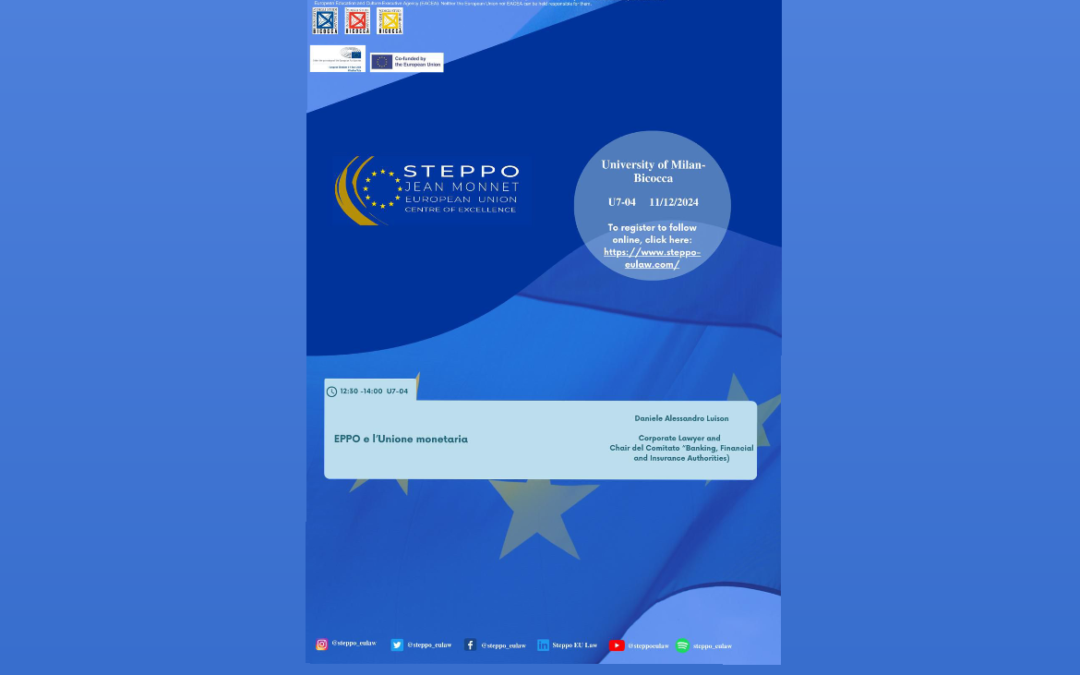Author: Matteo Ianni
Committee: Banking Insurance and Financial Authorities Committee
Date: 19/12/2024
On Wednesday, December 11th, Daniele Alessandro Luison, Chair of the Subcommittee on Banking, Financial and Insurance Authorities, will deliver a lecture titled “EPPO and the Economic and Monetary Union (EMU)” as part of the Center of Excellence STEPPO’s ongoing program. This event promises to shed light on the interplay between the European Public Prosecutor’s Office (EPPO) and the mechanisms of the EMU, providing valuable insights into how financial governance and legal frameworks contribute to a stable and resilient economic environment within the EU.
The Foundations and Objectives of the EMU
The Economic and Monetary Union (EMU) stands as a cornerstone of the European Union’s integration project, designed to foster sustainable economic growth, ensure high levels of employment, and enhance Europe’s role on the global stage. By aligning economic and monetary policies among its Member States, the EMU seeks to provide a unified response to shared challenges and opportunities.
The EMU operates across three key domains:
1. Monetary Policy and Price Stability
At the heart of the EMU is its commitment to maintaining price stability. The European Central Bank (ECB) plays a pivotal role in setting and implementing monetary policies that ensure inflation remains within target levels. Price stability is essential for sustaining purchasing power, promoting economic growth, and fostering financial stability across the euro area.
2. Economic Policy Coordination
The EMU emphasizes the coordination of economic policies to mitigate risks associated with unsustainable public finances or macroeconomic imbalances. Mechanisms such as the Stability and Growth Pact (SGP) and the European Semester provide frameworks for monitoring and guiding Member States’ fiscal and economic policies. This coordinated approach is critical to preventing crises that could undermine the entire Union’s economic health.
3. Functioning of the Internal Market
The EMU supports the seamless operation of the EU’s internal market, ensuring that goods, services, capital, and people can move freely within its borders. The introduction of the euro has further strengthened this integration by eliminating currency conversion barriers and fostering closer economic ties between Member States.
The Euro: Benefits and Global Impact
The adoption of the euro has had far-reaching implications for the economies of participating countries and the European Union as a whole.
• Cost Reduction in Financial Transactions
By replacing national currencies, the euro has significantly lowered the cost of cross-border transactions. Businesses and consumers benefit from simplified trade and investment processes, boosting economic activity within the euro area.
• Simplified Mobility
The euro has made travel and mobility across Member States more convenient by eliminating the need for currency exchange. This benefit extends to both individuals and businesses, fostering a sense of unity among European citizens.
• Enhanced Global Influence
As one of the world’s most widely traded currencies, the euro strengthens Europe’s position in global financial markets. It serves as a reserve currency and a benchmark for international trade, reflecting the economic power of the EU and its Member States.
Challenges and Opportunities: the role of the EPPO
While the EMU has achieved significant milestones, challenges remain. The financial crises of the past decades exposed vulnerabilities in the system, leading to reforms such as the establishment of the European Stability Mechanism (ESM) and the Banking Union. These initiatives aim to enhance resilience and ensure that the EMU can respond effectively to future shocks.
Moreover, the EPPO plays an emerging role in safeguarding the financial interests of the EU, including combating fraud, corruption, and financial crimes. The upcoming lecture by Daniele Alessandro Luison will delve into how the EPPO’s activities intersect with the EMU’s objectives, highlighting their shared goal of ensuring sound financial governance.
The Economic and Monetary Union continues to evolve, balancing economic integration with the diversity of its Member States. By fostering collaboration and promoting shared prosperity, the EMU remains a testament to the European Union’s commitment to unity and progress. Events like the upcoming lecture provide an opportunity to deepen understanding and spark discussions on the future of Europe’s economic and monetary policies.

